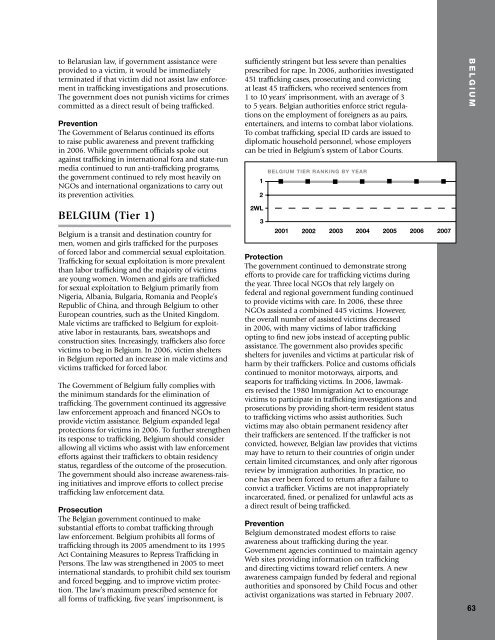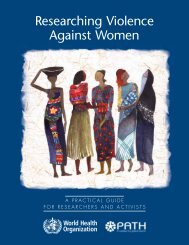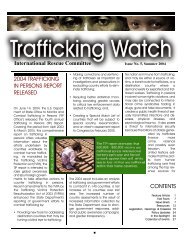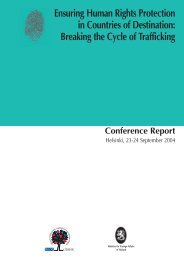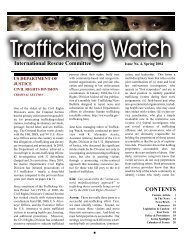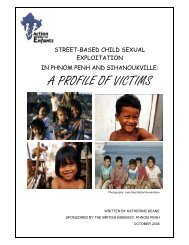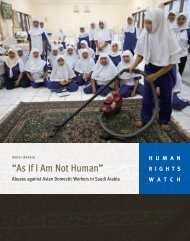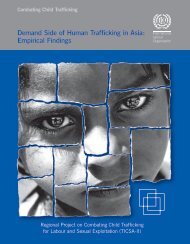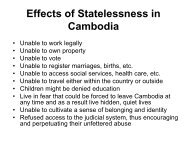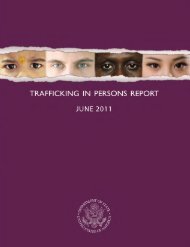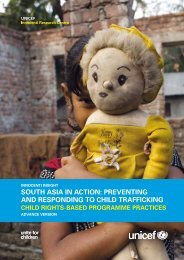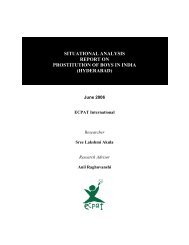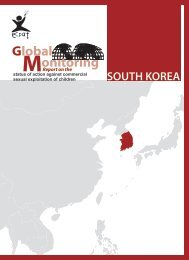2007 Trafficking in Persons Report - Center for Women Policy Studies
2007 Trafficking in Persons Report - Center for Women Policy Studies
2007 Trafficking in Persons Report - Center for Women Policy Studies
Create successful ePaper yourself
Turn your PDF publications into a flip-book with our unique Google optimized e-Paper software.
to Belarusian law, if government assistance were<br />
provided to a victim, it would be immediately<br />
term<strong>in</strong>ated if that victim did not assist law en<strong>for</strong>cement<br />
<strong>in</strong> traffick<strong>in</strong>g <strong>in</strong>vestigations and prosecutions.<br />
The government does not punish victims <strong>for</strong> crimes<br />
committed as a direct result of be<strong>in</strong>g trafficked.<br />
Prevention<br />
The Government of Belarus cont<strong>in</strong>ued its ef<strong>for</strong>ts<br />
to raise public awareness and prevent traffick<strong>in</strong>g<br />
<strong>in</strong> 2006. While government officials spoke out<br />
aga<strong>in</strong>st traffick<strong>in</strong>g <strong>in</strong> <strong>in</strong>ternational <strong>for</strong>a and state-run<br />
media cont<strong>in</strong>ued to run anti-traffick<strong>in</strong>g programs,<br />
the government cont<strong>in</strong>ued to rely most heavily on<br />
NGOs and <strong>in</strong>ternational organizations to carry out<br />
its prevention activities.<br />
BELGIUM (Tier 1)<br />
Belgium is a transit and dest<strong>in</strong>ation country <strong>for</strong><br />
men, women and girls trafficked <strong>for</strong> the purposes<br />
of <strong>for</strong>ced labor and commercial sexual exploitation.<br />
<strong>Traffick<strong>in</strong>g</strong> <strong>for</strong> sexual exploitation is more prevalent<br />
than labor traffick<strong>in</strong>g and the majority of victims<br />
are young women. <strong>Women</strong> and girls are trafficked<br />
<strong>for</strong> sexual exploitation to Belgium primarily from<br />
Nigeria, Albania, Bulgaria, Romania and People’s<br />
Republic of Ch<strong>in</strong>a, and through Belgium to other<br />
European countries, such as the United K<strong>in</strong>gdom.<br />
Male victims are trafficked to Belgium <strong>for</strong> exploitative<br />
labor <strong>in</strong> restaurants, bars, sweatshops and<br />
construction sites. Increas<strong>in</strong>gly, traffickers also <strong>for</strong>ce<br />
victims to beg <strong>in</strong> Belgium. In 2006, victim shelters<br />
<strong>in</strong> Belgium reported an <strong>in</strong>crease <strong>in</strong> male victims and<br />
victims trafficked <strong>for</strong> <strong>for</strong>ced labor.<br />
The Government of Belgium fully complies with<br />
the m<strong>in</strong>imum standards <strong>for</strong> the elim<strong>in</strong>ation of<br />
traffick<strong>in</strong>g. The government cont<strong>in</strong>ued its aggressive<br />
law en<strong>for</strong>cement approach and f<strong>in</strong>anced NGOs to<br />
provide victim assistance. Belgium expanded legal<br />
protections <strong>for</strong> victims <strong>in</strong> 2006. To further strengthen<br />
its response to traffick<strong>in</strong>g, Belgium should consider<br />
allow<strong>in</strong>g all victims who assist with law en<strong>for</strong>cement<br />
ef<strong>for</strong>ts aga<strong>in</strong>st their traffickers to obta<strong>in</strong> residency<br />
status, regardless of the outcome of the prosecution.<br />
The government should also <strong>in</strong>crease awareness-rais<strong>in</strong>g<br />
<strong>in</strong>itiatives and improve ef<strong>for</strong>ts to collect precise<br />
traffick<strong>in</strong>g law en<strong>for</strong>cement data.<br />
Prosecution<br />
The Belgian government cont<strong>in</strong>ued to make<br />
substantial ef<strong>for</strong>ts to combat traffick<strong>in</strong>g through<br />
law en<strong>for</strong>cement. Belgium prohibits all <strong>for</strong>ms of<br />
traffick<strong>in</strong>g through its 2005 amendment to its 1995<br />
Act Conta<strong>in</strong><strong>in</strong>g Measures to Repress <strong>Traffick<strong>in</strong>g</strong> <strong>in</strong><br />
<strong>Persons</strong>. The law was strengthened <strong>in</strong> 2005 to meet<br />
<strong>in</strong>ternational standards, to prohibit child sex tourism<br />
and <strong>for</strong>ced begg<strong>in</strong>g, and to improve victim protection.<br />
The law’s maximum prescribed sentence <strong>for</strong><br />
all <strong>for</strong>ms of traffick<strong>in</strong>g, five years’ imprisonment, is<br />
sufficiently str<strong>in</strong>gent but less severe than penalties<br />
prescribed <strong>for</strong> rape. In 2006, authorities <strong>in</strong>vestigated<br />
451 traffick<strong>in</strong>g cases, prosecut<strong>in</strong>g and convict<strong>in</strong>g<br />
at least 45 traffickers, who received sentences from<br />
1 to 10 years’ imprisonment, with an average of 3<br />
to 5 years. Belgian authorities en<strong>for</strong>ce strict regulations<br />
on the employment of <strong>for</strong>eigners as au pairs,<br />
enterta<strong>in</strong>ers, and <strong>in</strong>terns to combat labor violations.<br />
To combat traffick<strong>in</strong>g, special ID cards are issued to<br />
diplomatic household personnel, whose employers<br />
can be tried <strong>in</strong> Belgium’s system of Labor Courts.<br />
Protection<br />
The government cont<strong>in</strong>ued to demonstrate strong<br />
ef<strong>for</strong>ts to provide care <strong>for</strong> traffick<strong>in</strong>g victims dur<strong>in</strong>g<br />
the year. Three local NGOs that rely largely on<br />
federal and regional government fund<strong>in</strong>g cont<strong>in</strong>ued<br />
to provide victims with care. In 2006, these three<br />
NGOs assisted a comb<strong>in</strong>ed 445 victims. However,<br />
the overall number of assisted victims decreased<br />
<strong>in</strong> 2006, with many victims of labor traffick<strong>in</strong>g<br />
opt<strong>in</strong>g to f<strong>in</strong>d new jobs <strong>in</strong>stead of accept<strong>in</strong>g public<br />
assistance. The government also provides specific<br />
shelters <strong>for</strong> juveniles and victims at particular risk of<br />
harm by their traffickers. Police and customs officials<br />
cont<strong>in</strong>ued to monitor motorways, airports, and<br />
seaports <strong>for</strong> traffick<strong>in</strong>g victims. In 2006, lawmakers<br />
revised the 1980 Immigration Act to encourage<br />
victims to participate <strong>in</strong> traffick<strong>in</strong>g <strong>in</strong>vestigations and<br />
prosecutions by provid<strong>in</strong>g short-term resident status<br />
to traffick<strong>in</strong>g victims who assist authorities. Such<br />
victims may also obta<strong>in</strong> permanent residency after<br />
their traffickers are sentenced. If the trafficker is not<br />
convicted, however, Belgian law provides that victims<br />
may have to return to their countries of orig<strong>in</strong> under<br />
certa<strong>in</strong> limited circumstances, and only after rigorous<br />
review by immigration authorities. In practice, no<br />
one has ever been <strong>for</strong>ced to return after a failure to<br />
convict a trafficker. Victims are not <strong>in</strong>appropriately<br />
<strong>in</strong>carcerated, f<strong>in</strong>ed, or penalized <strong>for</strong> unlawful acts as<br />
a direct result of be<strong>in</strong>g trafficked.<br />
Prevention<br />
Belgium demonstrated modest ef<strong>for</strong>ts to raise<br />
awareness about traffick<strong>in</strong>g dur<strong>in</strong>g the year.<br />
Government agencies cont<strong>in</strong>ued to ma<strong>in</strong>ta<strong>in</strong> agency<br />
Web sites provid<strong>in</strong>g <strong>in</strong><strong>for</strong>mation on traffick<strong>in</strong>g<br />
and direct<strong>in</strong>g victims toward relief centers. A new<br />
awareness campaign funded by federal and regional<br />
authorities and sponsored by Child Focus and other<br />
activist organizations was started <strong>in</strong> February <strong>2007</strong>.<br />
B E L G I U M<br />
63


